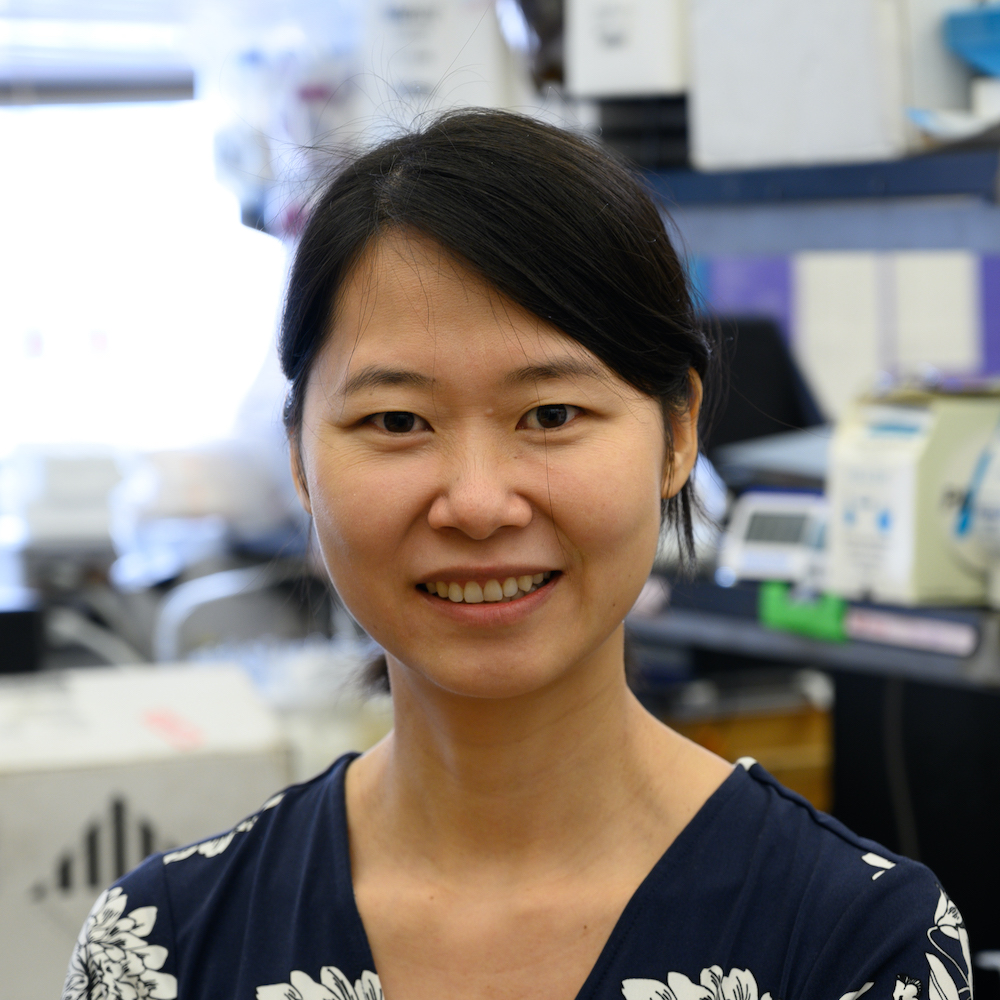Huaiying Zhang
Assistant Professor
Address:
601A Mellon Institute
Department of Biological Sciences
Carnegie Mellon University
4400 Fifth Avenue
Pittsburgh, PA 15213

Education
Ph.D., McGill University
Postdoctoral Fellow, Dartmouth College
Postdoctoral Fellow, Princeton University
Postdoctoral Fellow, University of Pennsylvania
Research
The phase transition process of liquid-liquid demixing organizes proteins and RNAs into liquid compartments in cells. We study how this process promotes cellular functions in healthy cells and how misregulation of it leads to cancer. Building on this, we engineer synthetic organelles by taking inspiration from cells and develop therapeutic strategies by targeting phase transition in cancer cells.
Investigate functional significance of phase transition in cells
We developed optogenetic tools to manipulate phase transition in live cells so we could observe the functional consequences. We focus on telomere DNA synthesis in cancer cells, a biochemical reaction that all cancer cells rely on for immortality. We demonstrated that condensation of liquid droplets on telomeres of telomerase-free cancer cells clusters telomeres to provide templates required for homology-directed DNA synthesis. We ask how the nucleation process is regulated, how the components are recruited , how the material properties are controlled and how they contribute to telomere DNA synthesis and cancer cell growth.
Engineer synthetic organelles
Using a bottom-up approach to construct liquid organelles will advance our understanding of liquid condensation in cells and inspire new applications exploiting phase transition. With advanced biophysical characterizations such as microrheologyand fluorescence correlation spectroscopy, we investigate how the material properties and chemical composition of liquid organelles are defined and how they affect biochemistry within.
Control phase transition for cancer therapy
We demonstrated that liquid condensation contributes to telomere elongation in telomerase-free cancer cells by clustering telomeres to provide templates required for homology-directed telomere DNA synthesis which cancer cells rely on for immortality. We set out to develop cancer therapies to inhibit telomere synthesis by combining experimental and theoretical approaches to manipulate phase behavior.
Recent Publications
Chemical dimerization-induced protein condensates on telomeres.
Journal of Visualized Experiments, 2021, e62173.
R. Zhao, D. M. Chenoweth, H. Zhang.
Tension promotes kinetochore-microtubule release by Aurora B kinase.
Journal of Cell Biology , 2021.
G-Y Chen, F Renda, H. Zhang, A. Gokden, D. Z. Wu, D. M. Chenoweth, A. Khodjakov, M. A. Lampson.
The glassiness of hardening protein droplets.
Science, 2020.
Huaiying Zhang.
Nuclear body phase separation drives telomere clustering in ALT cancer cells.
Molecular Biology of the Cell, 2020.
Huaiying Zhang, Rongwei Zhao, Jason Tones, Michel Liu, Robert Dilley, David M. Chenoweth, Roger A. Greenberg, and Michael A. Lampson.
Reversible control of protein localization in living cells using a photocaged-photocleavable chemical dimerizer.
Journal of the American Chemical Society, 2018.
C. Aonbangkhen,H. Zhang, D. Wu, M. A. Lampson, D.M. Chenoweth.
Optogenetic control of mitosis with photocagedchemical dimerizers.
Methods in Cell Biology – Mitosis & Meiosis, 2018.
H. Zhang, D. M. Chenoweth, and M. A. Lampson.
Optogenetic control of kinetochore function.
Nature Chemical Biology, 2017.
H. Zhang*, C. Aonbangkhen*, E Tarasovetc, E. R. Ballister, D. M. Chenoweth, M. A. Lampson. (*equal contribution).
Biophysical characterization of organelle-based RNA/protein liquid phases using microfluidics.
Soft Matter, 2016
N. Taylor, S. Elbaum-Garfinkle, N. Vaidya, H. Zhang, H. A. Stone, C. P. Brangwynne
RNA controls polyQ protein phase transitions.
Molecular Cell, 2015.
H. Zhang, S. Elbaum-Garfinkle, E. M. Langdon, N. Taylor, P. Occhipinti, A. A. Bridges, C. P. Brangwynne, and A. S. Gladfelter.
Coupling between cytoplasmic concentration gradients through local control of protein mobility in the Caenorhabditis elegans zygote.
Molecular Biology of the Cell, 2015
Y. Wu, H. Zhang, E. E. Grifin.
Ploidy variation in multinucleate cells changes under stress.
Molecular Biology of the Cell, 2015
C. A. Anderson, S. Roberts*, H. Zhang*, C. M. Kelly, A. Kendall, C. Lee, J. Gerstenberger, A. B. Koenig, R. Kabeche, and A. S. Gladfelter. (*equal contribution)
Septin assemblies form by diffusion-driven annealing on membranes.
Proceedings of the National Academy of Sciences, 2014.
A. A. Bridges, H. Zhang, S. Mehta, P. Occhipinti, T. Tani, A. S. Gladfelter
Protein aggregation behavior regulates cyclin transcript localization and cell-cycle control.
Developmental Cell, 2013.
C. Lee, H. Zhang, A. E. Baker, P. Occipinti, M. E. Borsuk, A. S. Gladfelter.
Lipopolymer gradient diffusion in supported bilayer membranes.
Journal of Royal Society Interface, 2011.
H. Zhang, R. J. Hill.
Concentration dependence of lipopolymer self-diffusion in supported bilayer membranes.
Journal of Royal Society Interface, 2011.
H. Zhang, R. J. Hill.
Lipopolymer electrophoresis in supported bilayer membranes.
Soft Matter, 2010.
H. Zhang, R. J. Hill.
Selection of adsorbents in the coupling technology of adsorption desulfurization and biodesulfurization.
Science in China Series B: Chemistry, 2007
H. Zhang, Q. Liu, Y. Li, W. LI, X. Xiong, J. Xing, H. Liu.
Preparation of (Ni/W)-γ-Al2O3 microspheres and its application in adsorption desulfurization for model gasoline.
Chemical Engineering Communications, 2007.
H. Zhang, G. Shan, J. Xing, H. Liu.
Improvement of biodesulfurization rate by assembling nanosorbents on the surfaces of microbial cells.
Biophysical Journal, 2005
G. Shan, H. Zhang, W. Cai, J. Xing, H. Liu.
Biodesulfurization of hydrodesulfurized diesel oil with Pseudomonas delafieldii R-8 from high density culture.
Biochemical Engineering Journal, 2006, 27: 305-309.
G. Shan, H. Zhang, J. Xing, G. Chen, W. Li, H. Liu.
Biodesulfurization of dibenzothiophene by microbial cells coated with magnetite nanoparticles.
Applied Environmental Microbiology, 2005.
G. Shan, J. Xing, H. Zhang, H. Liu.
π-complexation studied by fluorescence technique: Application in desulfurization of petroleum product using magnetic π-complexation sorbents.
Separation Science and Technology, 2005.
G. Shan, H. Zhang, H. Liu, J. Xing.
Deep desulfurization of hydrodesulfurized diesel oil by Pseudomonas delafieldii R-8.
Journal of Chemical Technology and Biotechnology, 2005.
G. Shan, J. Xing, H. Zhang, H. Liu.